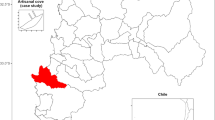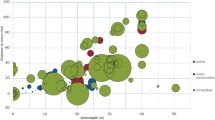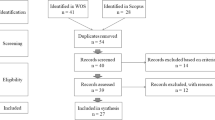Abstract
We trace the contributions of Colin Clark from his first book and articles published in the mid-1970s to date and link them to the six papers contained in this Special Issue and the larger fisheries economics literature. We highlight the impacts of Clark’s contributions on the theory, empirical, policy and management of fisheries, ranging from particular fisheries applications right through to global studies of the economics of fishing. Our conclusion is that Colin Clark’s impact upon fisheries economics has been revolutionary and predict that 100 years from now, his classic contribution, Mathematical Bioeconomics will still be studied with care by economists.

Similar content being viewed by others
Notes
Thus, for example, a recently published fisheries economics text, by Trond Bjørndal and Gordon Munro, The Economics and Management of World Fisheries, designed for academic students and practitioners, employs a capital-theoretic framework throughout (Bjørndal and Munro 2012).
This study was re-published, along with a set of comments from prominent fisheries economists, in 2003 (Crutchfield and Zellner 2003).
See Fig. 1.
“... it should be clear that the biological overfishing case, in which [fishing] effort is pushed to the point where physical yield actually declines, could not arise under private ownership of the resource” (Crutchfield and Zellner 2003, p. 19).
Optimal control theory was then coming into vogue among economists, particularly those specializing in capital theory.
The term “Golden rule” arises from the fact that Eq. (6) can be seen as a version of the Modified Golden Rule of Capital Accumulation from capital theory.
Although there are admittedly exceptions to the rule.
According to Google scholar as at December 27, 2014, this book has been cited more than 4,800 times!
See: n. 10.
The produced and human capital employed in the fishery was highly malleable with respect to the fishery (Gréboval and Munro 1999).
See Fig. 1.
References
Bjørndal T, Martin S (2007) The relevance of bioeconomic modelling to RFMO resources: a survey of the literature. Recommended best practices for regional fisheries management organizations: technical study no 3, Chatham House, London
Bjørndal T, Munro GR (2012) The economics and management of world fisheries. Oxford University Press, Oxford
Charles AT (1983) Optimal fisheries investment under uncertainty. Can J Fish Aquat Sci 40:2080–2091
Clark CW (1971) Economically optimal policies for the utilization of biologically renewable resources. Math Biosci 12:245–260
Clark CW (1973a) The economics of overexploitation. Science 181:630–634
Clark CW (1973b) Profit maximization and the extinction of animal species. J Polit Econ 81:950–961
Clark CW (1976) Mathematical bioeconomics; the optimal management of renewable resources. Wiley-Interscience, New York
Clark CW (1990) Mathematical bioeconomics; the optimal management of renewable resources, 2nd edn. Wiley, New York
Clark CW (2010) Mathematical bioeconomics; the optimal management of renewable resources, 3rd edn. Wiley, New York
Clark CW, Kirkwood G (1979) Bioeconomic model of the Gulf of Carpentaria prawn fishery. J Fish Res Board Can 36:1304–1312
Clark CW, Lamberson R (1982) An economic history and analysis of pelagic whaling. Mar Policy 6:103–120
Clark CW, Munro GR (1975) The economics of fishing and modern capital theory; a simplified approach. J Environ Econ Manag 2:92–106
Clark CW, Yoshimura J (2014) The economic incentives underlying resource and environmental depletion. Environ Resour Econ. doi:10.1007/s10640-014-9763-2
Clark CW, Clarke FH, Munro G (1979) The optimal management of renewable resource stocks: problems of irreversible investment. Econometrica 47:25–47
Clark CW, Munro G, Sumaila UR (2005) Subsidies, buybacks and sustainable fisheries. J Environ Econ Manag 50:47–58
Clark CW, Munro G, Sumaila UR (2007) Buyback subsidies and the ITQ alternative. Land Econ 83:50–58
Clark CW, Munro G, Sumaila UR (2010a) Limits to the privatization of fishery resources. Land Econ 86:209–218
Clark CW, Munro G, Sumaila UR (2010b) Limits to the privatization of fishery resources; reply. Land Econ 86:614–618
Costello C, Kinlan BP, Lester SE, Gaines SD (2012) The economic value of rebuilding fisheries, OECD Food, Agriculture and fisheries working papers, no 55. OECD Publishing, Paris
Crutchfield JA, Zellner A (1962) Economic aspects of the Pacific halibut fishery. Department of the Interior, Washington
Crutchfield JA, Zellner A (eds) (2003) The economics of marine resources and conservation policy. The Pacific halibut case study with commentary. University of Chicago Press, Chicago
Curtis R, Squires D (2007) Fisheries buybacks. Blackwell, Oxford
Flaaten O (2011) Fisheries economics and management. Norwegian College of Fishery Science, University of Tromsø, Tromsø. http://www.ub.vit.no/mmvnin/bitstream/handle/10037/2509/book.pdf?sequence=1. Cited 20 Dec 2014
Gooday P, Kompas T, Che N, Curtotti R (2010) Harvest strategy policy and stock rebuilding for commonwealth fisheries in Australia. In: The economics of rebuilding fisheries: workshop proceedings. OECD, Paris, pp 113–139
Gordon D (2013) The endogeneity problem in applied fisheries econometrics: a critical review. Environ Resour Econ. doi:10.1007/s10640-013-9740-1
Gordon HS (1954) The economic theory of a common property resource: the fishery. J Polit Econ 62:124–142
Gordon HS (1956) Obstacles to agreement on control of the fishing industry. In: Turvey R, Wiseman J (eds) The economics of fisheries. FAO, Rome, pp 65–72
Grafton RQ, Kompas T, Hilborn R (2007) Economic of overexploitation revisited. Science 318:1601
Grafton RQ, Kompas T, Hilborn R (2010) Limits to the privatization of fishery resources: comment. Land Econ 86:609–613
Gréboval D, Munro G (1999) Overexploitation and excess capacity in world fisheries: underlying economics and methods of control. In: Gréboval D (ed) Managing fishing capacity: selected papers on underlying concepts and issues. FAO fisheries technical paper no 386. FAO, Rome, pp 1–48
Jackman M, LeBlond P, Munro G, Newhouse DL (2002) Independent panel on access criteria for the atlantic commercial fishery, report of the independent panel on access criteria. Department of Fisheries and Oceans, Ottawa
Kompas T, Grafton RQ, Che N, Goody P (2009) Development of methods and information to support the assessment of economic performance in commonwealth fisheries. ABARE, Canberra
Lauck T, Clark CW, Mangel M, Munro GR (1998) Implementing the precautionary principle in fisheries management through marine reserves. J Appl Ecol 8(Suppl):S72–S78
Lent R (2010) Introduction. In: The economics of rebuilding fisheries: workshop proceedings. OECD, Paris, pp 17–29
Mangel M, Dowling N, Arriaza JL (2013) The behavioral ecology of fishing vessels: achieving conservation objectives through understanding the behavior of fishing vessels. Environ Resour Econ. doi:10.1007/s10640-013-9739-7
McAusland C, Najjar N (2014) Carbon footprint taxes. Environ Resour Econ. doi:10.1007/s10640-013-9749-5
McKelvey R (1985) Decentralized regulation of a common property renewable resource industry with irreversible investment. J Environ Econ Manag 12:287–307
McKelvey R (1987) Fur seal and blue whales: the bioeconomics of extinction. In: Cohen Y (ed) Applications of control theory in ecology. Springer, Heidelberg, pp 52–82
McKelvey R, Golubtsov P (2014) Restoration of a depleted transboundary fishery subject to climate change: a dynamic investment under uncertainty with information updates. Environ Resour Econ. doi:10.1007/s10640-014-9854-0
Milazzo M (1998) Subsidies in world fisheries: a reexamination. World Bank technical paper no 406, Fisheries Series. World Bank, Washington, DC
Miller KA, Munro GR, Sumaila UR, Cheung WWL (2013) Governing marine fisheries in a changing climate: a game-theoretic perspective. Can J Agric Econ 61(2):309–334
Munro GR (1992) Mathematical bioeconomics and the evolution of modern fisheries economics. Bull Math Biol 54:163–184
OECD (2010) The economics of rebuilding fisheries: workshop proceedings. OECD, Paris
Pearce DW, Turner RK (1990) Economics of natural resources and the environment. BPCC Wheatsons Ltd, Exeter
Quirk JP, Smith VL (1970) Dynamic Economic Models of Fishing. In: Scott AD (ed) Economics of Fisheries Management - A Symposium. University of British Columbia Institute of Animal Resource Ecology, Vancouver, pp 3–22
Sandberg P (2010) Rebuilding the stock of Norwegian spring spawning herring: lessons learned. In: The economics of rebuilding fisheries; Workshop proceedings. OECD, Paris, pp 219–233
Scott AD (1954) Conservation policy and capital theory. Can J Econ Polit Sci 20:504–513
Scott AD (1955) The fishery: the objectives of sole-ownership. J Polit Econ 63:116–124
Sumaila UR (1995) Irreversible capital investment in a two-stage bimatrix fishery game model. Mar Resour Econ 10(3):263–283
Sumaila UR, Cheung WWL, Dyck A, Gueye K, Huang L, Lam VWY, Pauly D, Srinivasan T, Swartz W, Pauly D, Zeller D (2012) Benefits of rebuilding global marine fisheries outweigh costs. PLoS ONE 7(7):e40542. doi:10.1371/journal.pone.0040542
Teh LSL, Teh LCL, Sumaila UR, Cheung WWL (2013) Time discounting and the overexploitation of coral reefs. Environ Resour Econ. doi:10.1007/s10640-013-9674-7
United Nations (1995) United Nations conference on straddling fish stocks and highly migratory fish stocks. Agreement for the implementation of provisions of the United Nations Convention on the Law of the Sea of 10 December 1982 Relating to the Conservation and Management of Straddling Fish Stocks and Highly Migratory Fish Stocks. UN Doc. A/Conf./164/37
Wilen JE (1985) Towards a Theory of the Regulated Fishery. Mar Resour Econ 1:369–388
World Bank (2009) The sunken billions: the economic justification for fisheries reform. World Bank, Washington
Author information
Authors and Affiliations
Corresponding author
Rights and permissions
About this article
Cite this article
Munro, G.R., Sumaila, U.R. On the Contributions of Colin Clark to Fisheries Economics. Environ Resource Econ 61, 1–17 (2015). https://doi.org/10.1007/s10640-015-9910-4
Accepted:
Published:
Issue Date:
DOI: https://doi.org/10.1007/s10640-015-9910-4




